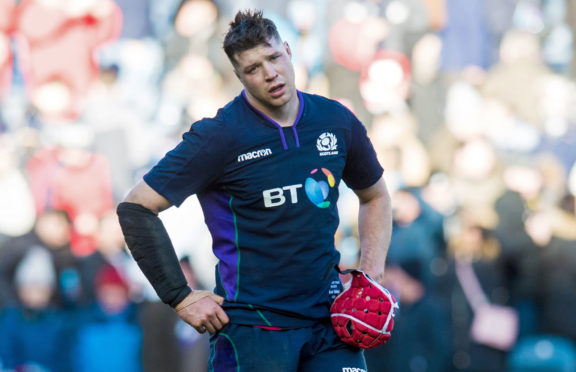We’re getting to accustomed to seeing Jim Hamilton, the former Scotland and Edinburgh lock, in media rooms across the country these days.
Jim seems to have carved out a decent niche for himself as a go-to media guy since he retired from playing.
There’s a certain irony in that as he didn’t really speak to us for a couple of years after he claimed to have been misquoted (he wasn’t, I had it recorded), but he was always a good interview and a thoughtful speaker and is a natural for his new vocation.
Only he’s different from his playing days; a lot different. He’s still the same dimensions height-wise, of course, but he now looks almost skinny compared to the muscled powerhouse I interviewed after his last game, the Heineken Champions Cup Final two years ago.
There’s nothing sinister in this, I hasten to add. Jim, like many power forwards, no longer has to do the intense weights programme demanded of modern-day rugby players. As a result, he’s reverted to his normal size.
You see this a lot. Donnacha O’Callaghan, the former Munster, Ireland and Lions lock, was at Murrayfield for the Heineken Cup quarter-final doing media duties for BT Sport,
He’s less than a year retired but looks so much smaller you wouldn’t think it possible he could have been one of the most powerful and physical forwards of his era.
It’s a clear example of the extremes that people have to put their bodies through to cope with the ever-increasing physical nature of rugby. All that power through weights is essential to deal with the seismic impacts in contact in today’s game.
You wonder what it’s done long term to these guys, and that’s even before we go back into the concussion debate.
Part of the reason that players need to be so bulked up is to deal with the attritional and gruelling nature of the rugby schedule. We’re coming to the end of the season and it seems everyone’s exhausted.
Rob Kitson of the Guardian summed it up quite well this week – when Maro Itoje hauls himself out of bed on the Sunday after playing in his biggest game of the club season, the Heineken Champions Cup Final next week at Newcastle, one wonders if he’ll think “wow, I’ve still got another month of games to play”.
Rugby’s schedule is a mess. Because the game isn’t joined up and there are conflicting (and soimetimes warring) factions, vested interests are constantly pulling against each other.
The reason the HCC Final is a month before the end of the European season (when it should surely be a grand finale) is because the French clubs insist their season ends with the Top 14 final.
LNR, the French club conglomerate, also insist that their season sustains a 26-game schedule, compared to the 22 of the English Premiership and 21 in the PRO14.
If you’re like Itoje, and you avoid injury, you can add in four autumn tests, five Six Nations games and nine more in the Heineken Cup. That’s a potential 40 games of super-intense, contact-heavy rugby.
Of course, under player welfare protocols, the games limit for an elite internationalist is much less than that.
Unions and clubs are a little reticent of saying what their limit actually is, but let’s take for an example Grant Gilchrist, the Edinburgh and Scotland lock. This season he’s played 10 PRO14 games, seven in the Heineken, and eight for Scotland. That’s 25 in all.
Had Edinburgh by some small miracle reached the final in both league and Europe, potentially Gilko would have played five more games.
30 games seems reasonable, but for many it’s still too much. Anthony Watson, the Bath, England and Lions wing, thinks that 20 should be the level, especially if you want a player operating at optimum level in every game. And Watson does not play in a physical position.
Player power came to the fore when the World Rugby’s Nations Championship proposal advocated three extra international games a month back.
Alun Wyn Jones, Keiran Reid and Jonny Sexton, the three most senior players in the world game, quickly intervened publicly on behalf of their brethern stating this was simply intolerable. Indeed the indication from them and others is that the demands are already too great.
The revelation that investors CVC want a new grand final between the champions of the PRO14 and the Premiership at the season’s end was greeted with eye-rolling by most. Another game, and an utterly pointless one given the combatants at Newcastle next week, when we should be cutting back.
But what gives? Given the Six Nations is sacrosanct and the English and French clubs are entrenched and refuse to shift, it would seem the Heineken would be sacrificed.
That would be a shame, and costly for Celtic unions.
But as there seems to be no appetite for rules changes to lessen the physical, attritional nature of the game, our responsibility to the welfare of players almost demands it.
